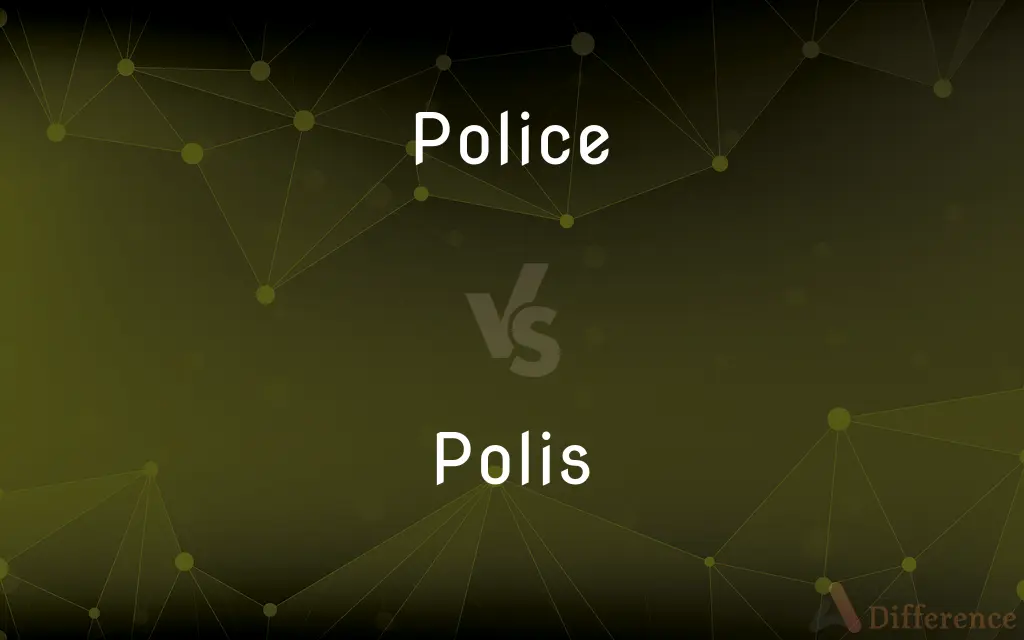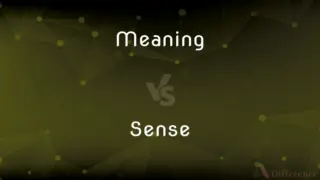Police vs. Polis — What's the Difference?
By Tayyaba Rehman & Maham Liaqat — Updated on April 1, 2024
Police enforce law and maintain order in modern societies, whereas "polis" refers to ancient Greek city-states, highlighting civic and community life.

Difference Between Police and Polis
Table of Contents
ADVERTISEMENT
Key Differences
Police are a body of officers representing the civil authority of government, tasked with enforcing laws, preventing crime, and ensuring public safety. On the other hand, a polis was an ancient Greek city-state, embodying the community's political, social, and religious life.
While police operate within a framework of law enforcement and public service in contemporary societies, the polis functioned as the center of Greek cultural, political, and military life, with its own governance and societal norms.
The concept of police is rooted in the need for order and safety within communities, employing various means of law enforcement. In contrast, a polis was a self-governing entity that emphasized civic participation and responsibility among its citizens.
Modern policing systems can be found globally, adapting to the specific legal and cultural contexts of different countries. The polis, however, was specific to ancient Greece, influencing Western political thought and democratic ideals.
Despite their differences, both institutions reflect the human need for structure and governance within their respective societies. While police maintain order through enforcement, the polis was a venue for civic engagement and the exercise of citizenship.
ADVERTISEMENT
Comparison Chart
Definition
A body of officers enforcing laws, maintaining order, and ensuring public safety.
An ancient Greek city-state, focusing on communal and civic life.
Context
Modern societies worldwide.
Ancient Greece.
Main Function
Law enforcement and public safety.
Center of political, social, and religious activities.
Governance
Operate under the government's civil authority.
Self-governed, with citizens playing a direct role in governance.
Cultural Significance
Reflects the societal need for order and safety.
Symbolizes the ideals of civic participation and democracy.
Compare with Definitions
Police
Engage in various duties including patrol, investigation, and traffic control.
Police officers often undergo rigorous training to handle diverse situations.
Polis
The foundational unit of ancient Greek society, combining government, culture, and religion.
Athens was a prominent polis known for its democratic principles.
Police
Enforcers of law and order within a community.
The police were called to address a disturbance in the neighborhood.
Polis
Governed by its citizens, reflecting early democratic and oligarchic systems.
The governance of each polis varied, with some leaning towards democracy and others oligarchy.
Police
Aim to prevent crime and protect citizens.
Community policing initiatives have strengthened ties between the police and local communities.
Polis
Served as centers for learning, culture, and philosophy.
The polis was often a hub for artistic and intellectual activity.
Police
Serve as a pillar of modern civil society.
Effective police work is crucial for maintaining law and order.
Polis
Influential in the development of Western political thought.
The concept of the polis deeply influenced modern ideas of citizenship and community.
Police
Operate under a structured hierarchy and legal framework.
She aspired to join the police force and contribute to public safety.
Polis
Characterized by direct participation of citizens in civic life.
In the polis, citizens gathered to make decisions about public matters.
Police
The police are a constituted body of persons empowered by a state, with the aim to enforce the law, to ensure the safety, health and possessions of citizens, and to prevent crime and civil disorder. Their lawful powers include arrest and the use of force legitimized by the state via the monopoly on violence.
Polis
Polis (; Greek: πόλις pronounced [pólis]), plural poleis (, πόλεις [póleːs]) literally means "city" in Greek. It defined the administrative and religious city center, as distinct from the rest of the city.
Police
A body of government employees trained in methods of law enforcement and crime prevention and detection and authorized to maintain the peace, safety, and order of the community.
Polis
A city-state of ancient Greece.
Police
A body of persons with a similar organization and function
Campus police. Also called police force.
Polis
(historical) A Greek city-state.
Police
(Archaic) Regulation and control of the affairs of a community, especially with respect to maintenance of order, law, health, morals, safety, and other matters affecting the public welfare.
Polis
The police.
Police
(Informal) A group that admonishes, cautions, or reminds
Grammar police.
Fashion police.
Polis
A police officer.
Police
The cleaning of a military base or other military area
Police of the barracks must be completed before inspection.
Police
The soldiers assigned to a specified maintenance duty.
Police
To regulate, control, or keep in order with a law enforcement agency or other official group.
Police
To impose one's viewpoint or beliefs regarding, especially in an authoritarian way
Policing others' comments by implementing speech codes.
Police
To critique in a presumptuous or arrogant manner
Policed the grammar of everyone who commented on the blog post.
Police
To make (a military area, for example) neat in appearance
Policed the barracks.
Police
A public agency charged with enforcing laws and maintaining public order, usually being granted special privileges to do so, particularly
Call the police!
Police
A department of local (usually municipal) government responsible for general law enforcement.
The Sheriff's Department has jurisdiction across most of Chicago but focuses on the unincorporated area and tasks like prisoner transport, leaving the rest to the Chicago Police Department.
Police
(UK) A branch of the Home Office responsible for general law enforcement within a specific territory.
Police
Any of the formally enacted law enforcement agencies at various levels of government.
Police
The staff of such a department or agency, particularly its officers; an individual police officer.
Police
People who try to enforce norms or standards as if granted authority similar to the police.
Who called the fashion police?
Police
Cleanup of a military facility, as a formal duty.
Police
Synonym of administration, the regulation of a community or society.
Police
(obsolete) policy.
Police
(obsolete) polity, civilization, a regulated community.
Police
(transitive) To enforce the law and keep order among (a group).
Extra security was hired to police the crowd at the big game.
Police
To clean up an area.
Police
To enforce norms or standards upon.
To police a person's identity
Police
A judicial and executive system, for the government of a city, town, or district, for the preservation of rights, order, cleanliness, health, etc., and for the enforcement of the laws and prevention of crime; the administration of the laws and regulations of a city, incorporated town, or borough.
Police
That which concerns the order of the community; the internal regulation of a state.
Police
The organized body of civil officers in a city, town, or district, whose particular duties are the preservation of good order, the prevention and detection of crime, and the enforcement of the laws.
Police
Military police, the body of soldiers detailed to preserve civil order and attend to sanitary arrangements in a camp or garrison.
Police
The cleaning of a camp or garrison, or the state a camp as to cleanliness.
Police
To keep in order by police.
Police
To make clean; as, to police a camp.
Police
The force of policemen and officers;
The law came looking for him
Police
Maintain the security of by carrying out a control
Common Curiosities
Did the polis have its own police force?
While not police in the modern sense, the polis had various mechanisms for maintaining order, often tied to the community's citizens.
What is the main function of the police?
The main function of the police is to enforce laws, maintain public order, and ensure community safety.
Can the term "polis" be applied to modern cities?
While modern cities share some characteristics with the polis, the term specifically refers to ancient Greek city-states.
Is the concept of the police a global one?
Yes, the concept of the police as law enforcement exists globally, although the structure and operations vary by country.
What is the significance of the polis in history?
The polis is significant for its contribution to political philosophy, democracy, and the concept of citizenship.
How does community policing relate to the concept of a polis?
Community policing shares similarities with the polis by emphasizing the role of citizens in maintaining public safety and order.
What governance structure did the polis have?
The governance structure varied, including democracies and oligarchies, depending on the polis.
How are police officers trained?
Police officers undergo comprehensive training in law, enforcement techniques, and community relations.
What was a polis in ancient Greece?
A polis was an ancient Greek city-state, embodying the community's political, social, and cultural life.
How do police differ from the concept of a polis?
Police are a modern law enforcement body, while a polis was an autonomous social and political entity in ancient Greece.
How does the role of citizens differ between police and polis?
In modern societies, citizens interact with the police primarily as part of the community being served, whereas in a polis, citizens directly participated in governance.
How do modern societies maintain the legacy of the polis?
Modern democracies maintain the legacy of the polis through civic engagement, public discourse, and the principles of citizenship.
What was the cultural life like in a polis?
Cultural life in a polis was vibrant, with a focus on philosophy, arts, and public discourse.
Were there laws in a polis?
Yes, each polis had its own set of laws, decided by its citizens or governing bodies.
Do police contribute to democracy?
Police contribute to democracy by upholding the law and ensuring that citizens can safely exercise their rights.
Share Your Discovery

Previous Comparison
Meaning vs. Sense
Next Comparison
Journey vs. TravelAuthor Spotlight
Written by
Tayyaba RehmanTayyaba Rehman is a distinguished writer, currently serving as a primary contributor to askdifference.com. As a researcher in semantics and etymology, Tayyaba's passion for the complexity of languages and their distinctions has found a perfect home on the platform. Tayyaba delves into the intricacies of language, distinguishing between commonly confused words and phrases, thereby providing clarity for readers worldwide.
Co-written by
Maham Liaqat













































